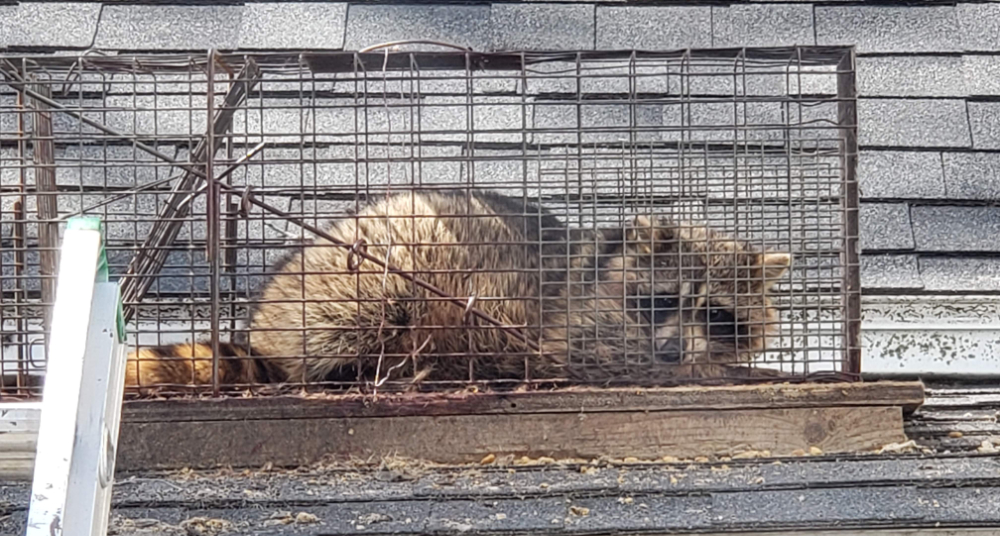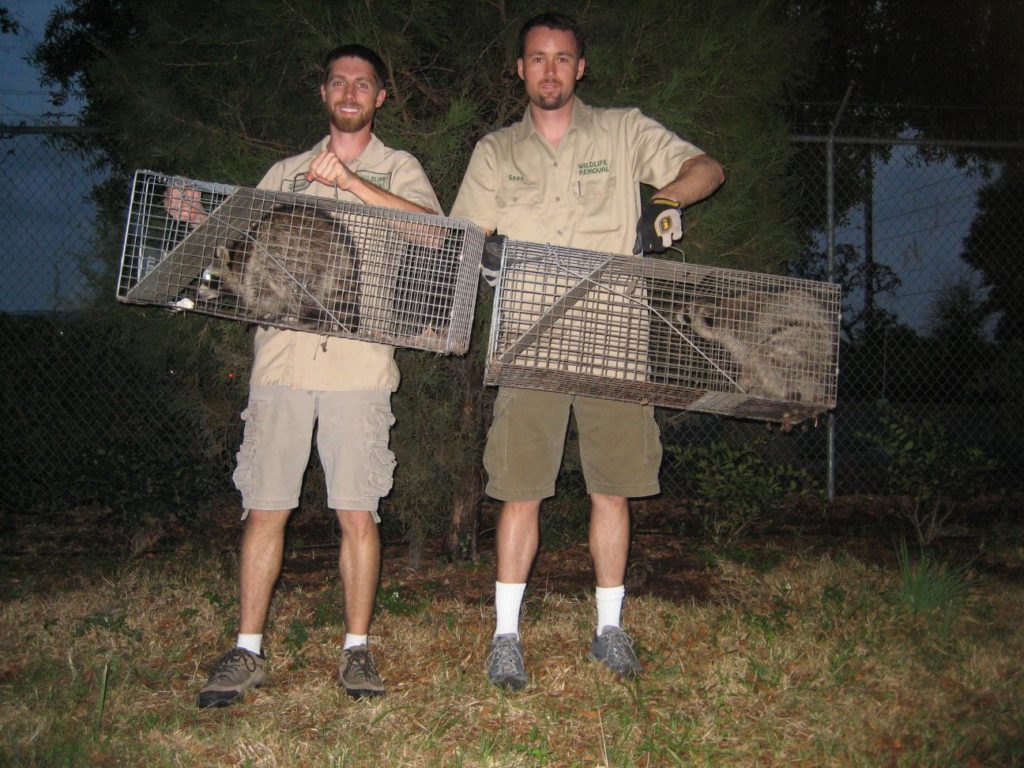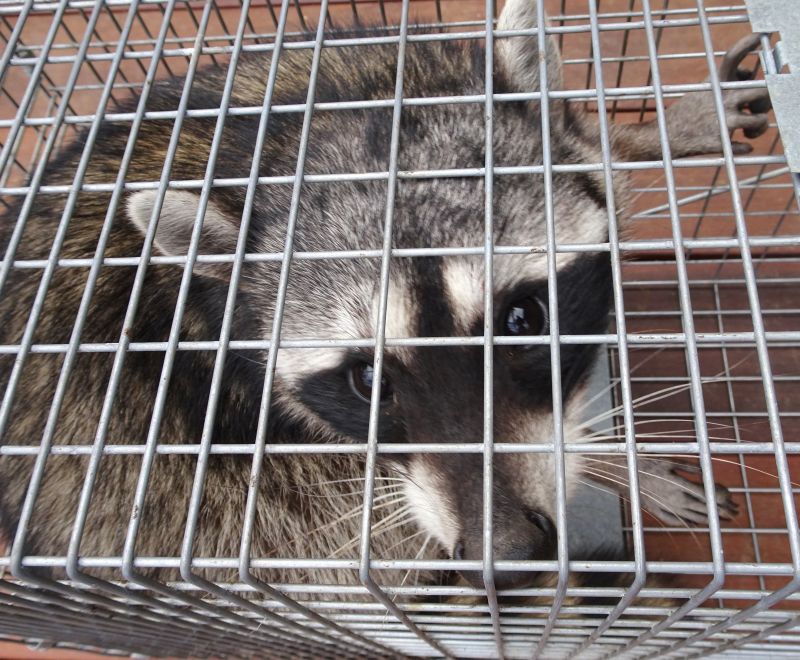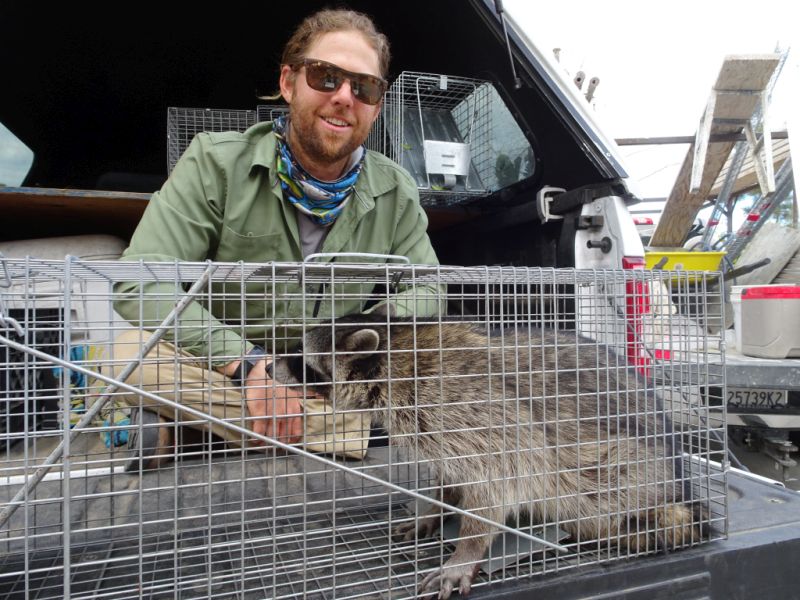There is often a need for raccoon removal in Springfield. Raccoons are a common pest animal throughout the county. They can be a headache for homeowners. Raccoons are noisy at night and can create a great deal of damage. They are also known to carry diseases. Raccoons will often seek out a home to build their nest.
If you suspect that you have raccoons living in your home, call us at 413-454-2711. Our trained specialists can take care of your raccoon problem, prevent their return, and clean up the damage that they have created.
We are able to remove the raccoons without risk to your family or your pets. They know the laws of your area and can effectively take care of raccoons in the home. You can probably find a way to get the raccoon out of your home on your own, but our wildlife technicians can do is safely, effectively and following all laws.
Raccoons in the Attic
Raccoons in the attic is common in Springfield. If they can get to your roof, they can get into your attic. They will often tear up roofing in an attempt to gain entrance. Once they find their way into your attic space they can cause a lot of damage. They will tear up insulation as they look to build nests for their young. They will leave droppings all over.
The best way to handle these animals is to call us in. We will trap the raccoons in the attic; as well as seal up the entry point into the attic. Sealing up the home of any gaps or holes is the best way to exclude raccoons.
Damage Repair
Damage repair is often needed from raccoons in your Springfield home. They will damage your home, roof or attic as they attempt to enter the home. They will tear up insulation and drywall as they build their nests. Dead raccoons, feces and urine will attract insects and this can cause even more of a headache for homeowners.
Once the raccoon has been removed you may be left with a good deal of damage to your home and attic. Insulation, wiring, and droppings are just a few things that may need repair after the raccoon has been evicted. We can fix all of this for you. We will ensure that contaminants are not spread throughout the home. Don’t try DIY to clean the raccoon damage as this places you and your home at risk. Due to the possibility of the spread of diseased materials, let us professionally clean your raccoon damage.
Our Humane Raccoon Removal Process
Raccoons, commonly known as the masked bandits, are highly destructive animals. They spill trash across your lawn, tear up and scatter your properties, chew electrical wires and insulation, and generally put your health at risk by their presence.
These animals carry several diseases such as rabies, and their waste is lethal when inhaled. The mistake some people unknowingly make is feeding them. Never give raccoons food. They are scavengers and will only come back for more.
Raccoons are nocturnal animals, meaning they are highly active at night and can disturb your sleep with their heavy footsteps, clawing, chewing, cries, and the other sounds they make in the process of damaging your house.
Removing raccoons from your house is not a job for everyone. It requires professionals like Nuisance Wildlife Pros to properly handle it. Getting rid of raccoons by yourself exposes you to danger as raccoons are fiercely aggressive, and more so when they feel threatened. They have long sharp claws and their bite can give you diseases.
How to Get Rid of Raccoons
There are different ways to remove raccoons from your property, and they all work hand-in-hand.
1. Prevention: The first and most important step is to protect your home from a raccoon invasion with the following tips:
- Tightly seal your trash bins and wedge them. This hinders raccoons from opening your garbage to forage and stops them from tipping the trash cans over.
- Keep all pet foods inside the house. Raccoons will eat anything, your pet’s food included.
- Trim your trees so they can’t climb onto your roof, and into your house.
- Remove shrubs, dead leaves, and weeds.
- Have your house regularly inspected for holes, cracks, and gaps.
Raccoons are mostly interested in eating, and if they are continuously unable to get food from your house, they will leave in search of another abode.
2. Bait Them: If raccoons have already gotten into your house, and are nesting in your attic, chimney, or walls, you can still humanely remove them. Using chicken, crisp bacon, fish, and fresh vegetables, raccoons can be successfully lured to a trap.
3. Trap Them: There are different kinds of traps to capture these pests. Luckily, the most trusted method is the humane removal method and this involves the use of a live trap while doing the following:
- Wear hand gloves to cover your scent. Raccoons have a great sense of smell and can avoid your trap if they perceive the human scent on it.
- Firmly attach your bait to the trap
- Properly wedge your trap so the raccoons won’t damage it
- Always set multiple traps
- Place the traps along the routes the raccoons’ pass.
When the raccoon is caught, you will have to transport it and release it about 10 miles away from your house.
More importantly, before you embark on trapping that pesky raccoon in your house, familiarize yourself with the laws concerning raccoon removal and relocation. It is often the best option to leave the job to licensed professionals such as Nuisance Wildlife Pros, so as not to be caught on the wrong side of the law.
Removing Raccoons from Your Attic and Chimney
Raccoons go through your roof, air ducts, vents, windows, as well as tiny gaps along your walls, to get into your attic and chimney. Once in your attic, they rip up your insulation, wires, and other materials to build nests to have their young.
Raccoons can have up to 7 cubs in one litter, and these cubs remain with their mother up to 7 weeks after birth. Any attempt to remove the mother raccoon can lead to dire consequences not only for you but also for the cubs. You can learn more about raccoons in the attic at: raccoonatticguide.com.
How do you get rid of them from the attic or chimney?
The first and best answer is to get professionals to do the job. However, if you wish to do it yourself, there are some things you should know
- Wear protective gear.
When entering the attic, wear protective coverings to prevent injuries from scratches and bites, should the raccoon get aggressive.
- Use the proper raccoon removal equipment
- Wait till the raccoon goes out at night to scavenge for food then seal all openings
- Carry the cubs and use them as live bait for the mother raccoon.
When the mother raccoon is not in the attic, gently pick up the cubs and place them in a cardboard box. Place this box along with one of the routes the mother raccoon passes, and seal all holes in your house.
For your chimney, try scaring them away by placing a loud radio close to the hamper. Put a rag soaked in predator fluid inside the chimney. The scent coupled with the noise will scare the raccoons away. If those two tactics don’t work, use the cubs as live bait.
Getting raccoons out of your house is just one step. You have to make sure there are no openings or weak walls in your house through which they can get back in. This complete work can only be done right by professional wildlife removal services such as Nuisance Wildlife Pros. Give us a call today.
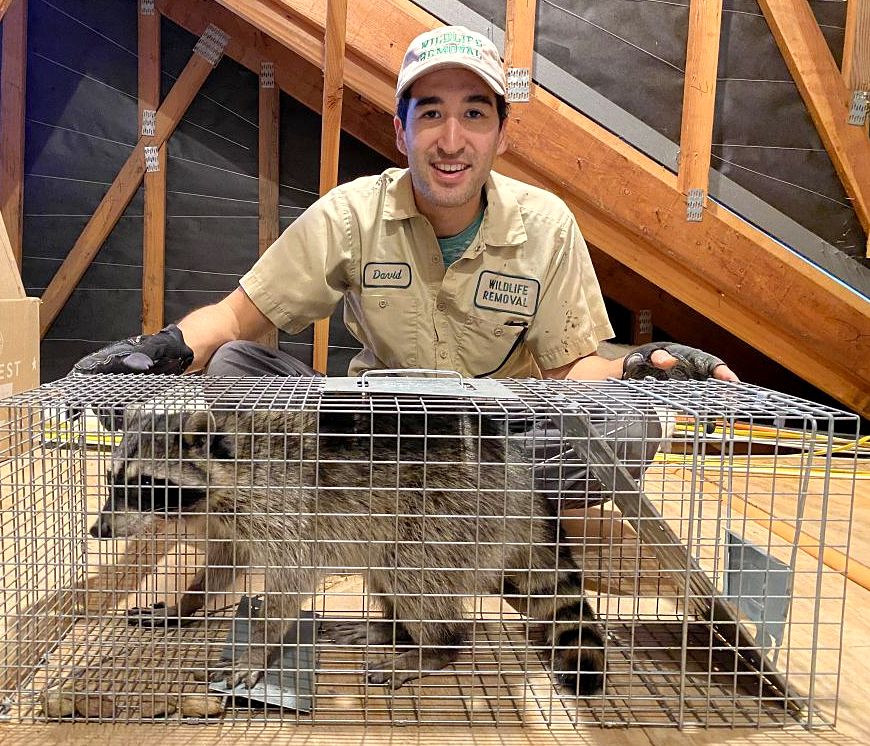
How to Keep Raccoons Out of The Garbage
Have you ever woken up early in the morning only to find your garbage can tossed over, with trash littered all around your yard? Raccoons are a very likely culprit!
You see, raccoons aren’t called trash pandas for no reason. They will open the garbage lid with their nimble fingers and treat themselves to whatever delicacy they find. And since they’re omnivores, they can pretty much eat anything.
But the last thing you want is a raccoon on your property. Why? Because it’s only a matter of time before they find their way into your attic, garden and cause innumerable damages. That’s why keeping raccoons out of your garbage is a necessary step to avoid raccoon infestation problems.
Over the past two decades, Nuisance Wildlife Pros has helped countless homeowners take care of all sorts of raccoon problems. And in this post, we share some of our most essential tips for keeping raccoons out of the garbage.
- Secure your cans properly
You must make your garbage cans an impenetrable fortress to raccoons. How can you do that? First, you want to use only aluminium cans because raccoons have powerful jaws and can easily rip through plastic cans.
But more importantly, you must ensure that the lid of your trash can is well secured. You can choose a locking metal trash can or install an extra lock or two connected with a chain-and-padlock combo. Alternatively, you can place extra weight like a heavy rock or cinder block on top of your lid.
- Practice proper ‘garbage’ hygiene
Even when dealing with trash, there’s a hygienic way to do it. Here are some of the things you must bear in mind:
- Ensure that you double-bag trash that is intense to contain smells that may attract raccoons.
- Clean and disinfect your trash cans regularly to remove lingering odor and residue.
- Ensure that you dispose of your trash as quickly as possible.
- Use repellents
Repellents are substances used to deter raccoons. There are different kinds of repellents, and they can be grouped into separate categories.
Scent repellents give off offensive scents that raccoons find offensive, like ammonia. Spices and oils like mint, mustard oil, and cayenne pepper also give off odors that raccoons hate. Try sprinkling these substances around your trash cans to keep raccoons away.
There are also commercial repellents that can help scare away raccoons. For instance, synthetic wolf urine can help deter raccoons by tricking them into thinking a predator is nearby.
Another strategy is to make use of deterrents. For instance, placing a talking radio near your trash can will keep raccoons away as they are tricked into thinking humans are nearby.
Motion-activated water sprinklers and lights can also help to startle raccoons that come near your trash cans, forcing them to retreat to safety.
- Keep your yard free of other attractants.
At Nuisance Wildlife Pros, we tell our clients that it does little to no good if your trash cans are adequately secured, but other attractants are still in your yard. If that’s the case, it’s only a matter of time before raccoons find their way into your trash cans. That’s why you must:
- Ensure you take your pet food inside, especially at night.
- Sweep away seed crumbs from under your birdfeeder.
- Ensure that you trim tall shrubs in your yard to remove hiding spots.
- Seal all potential entry holes in your house and property.
Wrap Up
Raccoons are intelligent critters with hundreds of inventive ways to break into garbage cans. But by following the recommendations suggested in this post, you can keep them out for good.
And if you need a robust plan to resolve your raccoon infestation problem, you can contact us today at Nuisance Wildlife Pros.
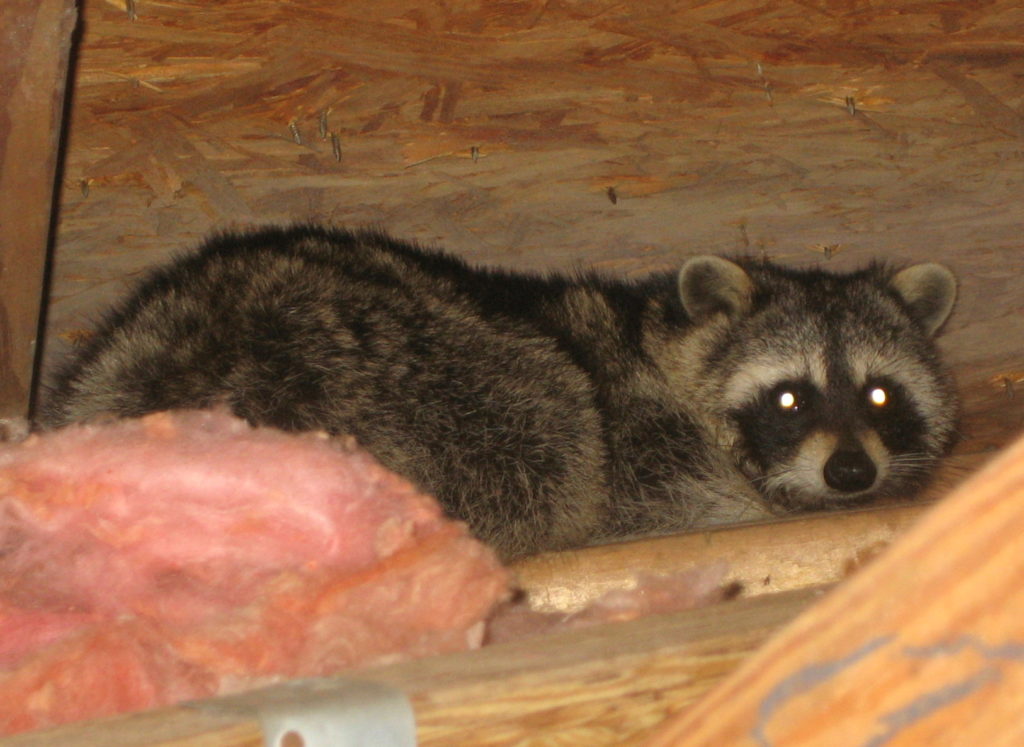
How to Remove Raccoons Under Shed
No doubt, the sight of a raccoon can evoke the sweetest of emotions to the mind of the “unknowing.” However, it is not always so. Raccoons are not just a threat to humans and pets; they also wreak havoc to the area around them in search of food.
Raccoons are tireless and aggressive animals, and you don’t want to have them near your surroundings, gardens, or even inside your Shed. There are many reasons why you should prevent Raccoons from entering your property in the first place, talk less of your Shed.
However, if you eventually find a raccoon in your Shed, you cannot just “relocate them,” It is usually more complicated than that. Your ultimate solution will be to hire an animal removal service like ours and see why;
You may Orphan the Raccoons.
The periods between January and September are sensitive periods to “relocate” a raccoon because it is usually a mother Raccoon. While many may claim trapping or relocation as the best this period, it is not. It is the most dangerous action for the mother and young Raccoons to relocate during this period.
Such “humane” intervention may very well be a destructive means of dealing with the Raccoon.
If you discover a raccoon problem, the first step is to investigate that you are not dealing with a “family Raccoon” problem. However, if so, you should either contact our services or wait till the Raccoons come of age.
However, if there are no baby Raccoons in the Shed as earlier feared, here are some DIY methods you can take to remove the Raccoons;
- Install Lights in the Shed
Most of these animals prefer the Shed because it is warm, quiet, and dark. However, you can tweak any of these features by flooding the Shed with lights. Such harassment will show these Raccoons that the area has become unloveable for them.
- Loud noises around the Shed
Similar to harassing them with lights, Raccoons don’t like sudden or frequent noises, especially when it seems like human actions. A tuned radio will do the job, and the consistent flow of voices will be enough to convince the Raccoon that such areas are out of bounds.
- Fill the Shed with unpleasant smells.
Certain smells repulse almost all Pests/wildlife. Luckily, some of these odors can be made locally. For Raccoons, a scent of old rags dipped in Apple cider vinegar or ammonia will do the trick. You can put this solution in plastic bags and make some holes to allow the smell to spread.
Likewise, the smell of used cat litter can equally irritate their respiratory systems.
- Physical Harassment
Raccoons will largely avoid any confrontation with humans. If they hear human footsteps or smell them, they will scamper or use other paths. A good way to make the Shed unliveable is to clean up or arrange the sheds constantly.
Making these constants and spontaneous visits to the Shed will inform them that such areas are unlivable.
- Trapping the Raccoons in the Shed
Live door traps are the popular human ways to trap raccoons from entering your Shed. Once the Raccoon unknowingly takes the bait and enters the trap, the door closes instantly, leaving the Raccoon to struggle for freedom.
You can relocate trapped Raccoons to areas well far from residences.
After removing Raccoons
Once you remove Raccoons in your Shed, you must take precautions not to lure them back. Since raccoons are great scavengers, they will search all possible places for food. Things that can attract them to your property or shed include;
Unkempt trash areas,
Pet Foods in the open,
Dirty surroundings,
Unsealed openings in your Shed, decks, or property

